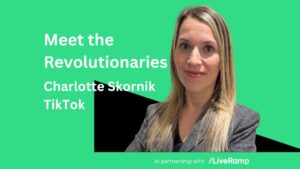New Digital Age (NDA), in association with LiveRamp, is spotlighting the men and women championing a data-led revolution in the marketing industry. ‘Meet the Revolutionaries’ focuses on the efforts of the industry executives helping to push digital marketing into a new era of data collaboration.
Here, Will Gough, AV Product Lead at Dentsu shares his thoughts on how the use of data is reshaping the advertising marketplace across TV and video…
Tell me about your current role and how your career led you here.
My background is in TV and TV planning. I started around 15 years ago, and worked my way through the ranks at Dentsu, with a brief stint at Sky. I developed a well rounded view of the TV and digital video marketplaces, the interplay between the two, and the various different planning processes involved for advertisers.
I then moved to a product-focused role internally for Dentsu about three years ago. That role has since expanded to become a bit more all-encompassing, looking at our advanced AV capability across Dentsu and our premium video solution Total TV.
There are two key focus areas for me at the moment: The first is addressability and looking at how we can create audiences that leverage data and can enrich Dentu’s own proprietary audience panel CCS. Secondly, I’m looking at how we can integrate this into new planning and measurement solutions, and crucially finding the best ways to activate across the various different supply paths, e.g broadcasters, programmatic, YouTube, etc.
It’s a very diverse and interesting role. I’m involved in lots of different conversations and have to challenge my own thinking on subjects all the time.
Can you give an example of a time when you personally have helped to drive innovation?
When I first started in my current role, the TV data we were receiving was the standard BARB data reported against the 13 different Barb regions and was fairly macro in its insights. We were then able to get our hands on TV data reported at a postcode level, so we were able to understand viewing habits against all of those different postcode areas and identify high and low indexing areas for TV consumption. The idea behind that was to offset the low indexing areas with various forms of digital video, helping to fill in the gaps of a larger campaign and provide incremental reach. Working with measurement partners and relying on some higher resolution reporting from our supply partners, we were able to provide a view on all up reach and frequency across each of the 120 postcode areas, as well as the campaign as a whole. The results were great and set us on the path to what we’re doing now.
What are the most common challenges or barriers to innovation?
There’s always an existing status quo in terms of how things are done in any organisation. The TV industry has a lot of legacy practices that are fairly entrenched, so being able to break away from that and think in a new way is always a particular challenge. It’s important to fully understand the problem you’re trying to solve. Convincing people internally and getting their buy-in is a big step forward. The bigger the investment required, the bigger the challenge.
Something I’ve learned on this journey is that the devil is in the detail a lot of the time. Having a broad idea is great, but being able to then articulate that and go through a journey of discovery of what might work and what won’t work is very beneficial in terms of deciding which ideas to move forward with and which to put back on the shelf for later on.
What tips can you offer others hoping to drive innovation?
Having self-belief and conviction in what you’re trying to achieve is really important. That said, don’t be afraid to fail or to dial back on an idea, or reiterate an idea. You might have this perfect solution in your head, but if it unravels a bit as you go through the discovery process, don’t be afraid to let it unravel and then rebuild whenever you need to.
Being able to identify and address gaps in your own knowledge is key. There are times when you’ll have to put yourself in uncomfortable situations and difficult meetings, so being able to lean on other people to help fill in those gaps is something you need to get used to.
How do you think digital marketing might evolve over the next few years?
Obviously, everyone is talking about AI right now. Conceptually, everyone kind of gets it and its been around in different guises for longer than OpenAI has been around, but what does it actually mean to marketers? At a media or channel level, AI becomes quite difficult to unpack. Clearly, AI can deliver a level of automation, personalisation and optimisation for marketers. A space I do find really interesting is getting the correct emotive context in TV, GenAI and multi large language models could get us to a stage where TV ads resonate with an audience like never before. And this is proven to work and drive impact for advertisers. However in a TV setting, personalised advertising can seem really creepy to viewers if you don’t get it right, so there’s a balancing act to be struck between what we could and what we should do with AI and data.
The TV marketplace is really fragmented at the moment, with lots of suppliers operating in their own walled gardens, so being able to target a single audience and buy and activate across all those providers is a big focus for the industry right now. Likewise, the challenge of bringing lots of different measurement solutions together to provide a rich view of campaigns is something we’ll all need to address as we move forward.
Will data collaboration become more important to marketers?
In TV up until about 5 years ago, data wasn’t part of the conversation. The cliche saying ‘TVs now in a golden age’ is very true, in my opinion there’s never been a better time to work in TV and the potential of data collaboration is very exciting. We’ve never had lots and lots of audience data to play with, so being able to access data through collaboration is really interesting. As privacy regulations increase and third party cookies disappear, I think data collaboration will become super valuable in terms of unlocking insights and activation routes for advertisers.
The popularity of Retail Media Networks is an indicator of where things are going. For TV advertisers, bringing different data sets together to enrich your own data (such as CRM data, sales data from advertisers or panel data) offers the opportunity to understand how your target audiences are consuming media at a granular level. It’s an exciting time.











